
Boosting High School
Graduation Rates
Boosting High School
Graduation Rates
Graduation Matters Montana has helped the state raise its high school graduation rate to its highest level in years.
Six years ago, the Dennis and Phyllis Washington Foundation saw a serious problem when more and more Montana high school students started dropping out of school each year. After years of steady decline, the state’s annual high school dropout rate was creeping upward again, topping 5 percent in 2009.
Research shows that high school dropouts are more likely than graduates to be in poor health, living in poverty and on public assistance. They are twice as likely to be unemployed, and eight times more likely to be in jail or prison. They are also far less likely to be involved in their communities, representing only 3 percent of citizens who vote or volunteer with civic organizations. Having a high school diploma also opens doors to economic success. According to the U.S. Census Bureau, the average high school graduate makes $6,734 more annually compared to a dropout.
Fast forward to today.
In 2015, 86 percent of Montana’s class graduated on time, the highest rate since the Montana Office of Public Instruction began tracking the number in 2000. Montana’s yearly dropout rate has been cut by more than a third, falling from 5 percent in 2009 to 3.4 percent in 2015. The Alliance for Excellent Education estimates that as a result of increases in the graduation rate from 2009 to 2015, Montana will see a $6 million annual boost to the state’s economy. The graduates added over that period will also likely earn a collective $90 million more over the course of their lifetimes, compared to what they would have earned had they not graduated from high school.
The dramatic increase in the state graduation rate is largely the result of the implementation of a program called Graduation Matters Montana, a statewide initiative that now includes 58 communities and 80 percent of high school students in Montana. At its core, Graduation Matters Montana is a deep partnership between local school districts and their communities, the Office of Public Instruction and private donors. The Dennis and Phyllis Washington Foundation has been a major supporter of Graduation Matters Montana since its inception in 2010, investing more than $900,000 over the life of the program.
The State of Montana is achieving its highest high school graduation rate in years.
The Dennis and Phyllis Washington Foundation’s philosophy is driven by our founders’ belief that access to a high quality education is the single most important determinant of success in life. To that end, the Foundation believes that focusing our resources on graduation and drop-out rates will ultimately have a positive impact on addressing perennial societal problems of homelessness, poverty, hunger, and incarceration rates, especially for minority populations.
Given what we learned about the importance of graduation from high school and its potential impact on the trajectory of a youth’s life, the Foundation began searching for a pilot program or demonstration project that focused on student success for all, whether it’s children with special needs, children who are gifted and talented, students who thrive in a strong, broad-based academic atmosphere, or youth looking for a career path in the crafts, trades, or industry. The Foundation found such a program in the local school district in our hometown of Missoula, Montana.
The program we discovered, Graduation Matters, is premised on the simple idea that more students should be graduating from high school prepared for college and careers. To achieve this, the program creates school-based and community-based opportunities tailored to meet local needs. For example, Graduation Matters established support networks between schools, businesses and community organizations to foster student success. The program also offers students a variety of “wraparound” services to ensure that struggling students and families were getting the support they needed outside the classroom.
Graduation Matters Missoula produced such dramatic results in Missoula County Public Schools from its inception in 2007 to 2009 that we were convinced the model should be scaled up for use statewide.
 The Foundation’s initial grant to Graduation Matters Montana helped expand the initiative to communities across Montana, in the form of challenge funds of up to $10,000 to help communities implement successful dropout prevention strategies. In 2015, 35 Montana communities received a challenge grant to assist them in reaching higher goals. If these communities are successful, Graduation Matters Montana is on track to cut the statewide dropout rate in half by 2016.
The Foundation’s initial grant to Graduation Matters Montana helped expand the initiative to communities across Montana, in the form of challenge funds of up to $10,000 to help communities implement successful dropout prevention strategies. In 2015, 35 Montana communities received a challenge grant to assist them in reaching higher goals. If these communities are successful, Graduation Matters Montana is on track to cut the statewide dropout rate in half by 2016.
The most important component of the Graduation Matters Montana model is the ability of each participating school or school district to craft the necessary wrap-around services required to support students and families. Locally appointed committees of dedicated teachers, administrators, nonprofit staff, business representatives and other interested community members develop school-specific plans to carry this out. These local customizations often lead to innovations, such as Hardin, Montana’s “Freshman Academy” for at-risk students and peer-mentoring program; Stevensville’s monthly student assemblies, which provide a forum to talk about success strategies; and Laurel’s use of an “early warning system” to better identify at-risk students.
The program also considers the input of those most directly affected by the plan: the students. Created by Montana Superintendent of Public Instruction Denise Juneau, the 40-member Superintendent’s Student Advisory Board gathers semiannually to discuss ways to improve opportunities for all students, raise the graduation rate and encourage more students to pursue post-secondary education and training.
Graduation Matters Montana is also engaging student voices and ideas through its “I Pledge to Graduate” campaign, which it launched in the 2011-2012 school year in partnership with local school districts. Students pledge to a significant adult that they will graduate and identify specific reasons why graduation is important to them. Research shows that students are more likely to reach a goal if they identify their own motivations when committing to meet it. Today, 80 percent of Montana high school students attend a Graduation Matters school, and more than 11,000 students have taken the pledge to graduate.
Ultimately, Graduation Matters Montana is about ensuring that every student in Montana, regardless of ZIP Code, has an equal shot at success. We are proud of the investments we’ve made to bring this about in our state.
Mike Halligan is the Executive Director of the Dennis and Phyllis Washington Foundation.
Philanthropy
Dennis and Phyllis Washington Foundation
Project
Graduation Matters Montana


